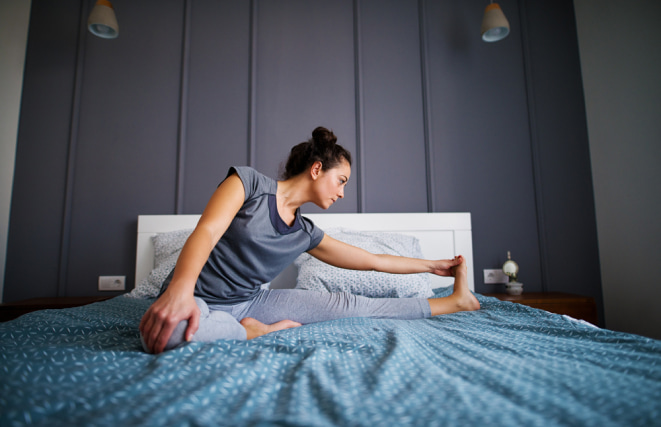The impact of evening exercise on sleep quality is a topic of considerable interest and debate. With busy schedules, many people find that evening workouts are a convenient option. However, there is ongoing discussion about whether exercising before bedtime, positively or negatively affects sleep patterns. Understanding how different types of physical activity, their timing, and individual responses influence sleep quality is essential for optimizing both exercise routines and nightly rest (Pacheco & Rehman, 2023).
The impact of evening exercise on sleep quality
Traditionally, engaging in physical activity close to bedtime has been discouraged due to potential negative effects on sleep quality. However, some studies suggest that this may not always be the case. Researchers have found that moderate-intensity exercise performed at least one hour before bedtime could possibly help you fall asleep faster and enjoy a more restful sleep. Activities such as walking or practicing yoga could help relax the mind and body, preparing them for a restful night (LeWine, 2024).
On the other hand, high-intensity exercise performed close to bedtime could have mixed effects. Although responses vary from person to person, completing intense workouts too close to bedtime—such as within one hour—could delay sleep onset and decrease sleep quality. Therefore, adjusting your exercise routine based on how your body reacts could be a great way to maintain good sleep quality (Frimpong, Mograss, Zvionow & Dang-Vu, 2021).
Best times of the day to exercise for quality sleep
Some research indicates that morning aerobic or resistance exercises, like running or weightlifting, could help you fall asleep faster at night. Additionally, high-intensity workouts in the afternoon or early evening could also promote restorative sleep by reducing the levels of a neurotransmitter that promotes wakefulness. Finding the right exercise time often depends on personal routines and sleep patterns (Pacheco & Rehman, 2023).
Since there is no right or wrong answer, the best time of the day to exercise could depend on your personal lifestyle. To find the exercise time that best suits you, you may need to experiment yourself! (Pacheco & Rehman, 2023).
Tips for maintaining good sleep hygiene
In addition to regular exercise, you could try to incorporate some of these simple tips for a restful night (Pacheco, Rosen, 2023):
1. Don’t take long naps during the day: In case you need a nap, you could try to restrict it to no more than 30 minutes in the early afternoon (LeWine, 2024).
2. Incorporate sleep-friendly techniques: Engage in activities like stretching or yoga that could immerse you in a state of relaxation (Pacheco & Singh, 2023).
3. Create a sleep-friendly environment: You could achieve this by dimming the lights, turning off the TV and computer screens, and doing a quiet activity. This could also include sleeping in a cool, dark room, and making sure your bed and bedding are comfortable (Godman & Komaroff, 2024).
4. Establish a calming pre-sleep routine: Activities such as reading, taking a warm bath, or practicing meditation could signal to your body that it’s time to wind down (Pacheco & Rosen, 2023).
Following these practices could help you achieve a healthy balance between physical activity and quality sleep (Pacheco & Rosen, 2023).
Finding the right balance
Evening exercise offers both benefits and challenges for sleep quality. To optimize the advantages and minimize potential drawbacks, it is advisable to consider both the timing and intensity of your workouts. While moderate exercise performed at least one hour before bedtime is generally favorable, research in this area is varied, and no single answer fits all! (Pacheco & Rehman, 2023).
Adjusting your routine based on how your body responds and combining it with healthy sleep hygiene practices could result in good sleep quality and general well-being (Pacheco & Rehman, 2023).
Sources:
1. Frimpong, E., Mograss, M., Zvionow, T., & Dang-Vu, T. T. (2021). The effects of evening high-intensity exercise on sleep in healthy adults: A systematic review and meta-analysis. Sleep Medicine Reviews, 60, 101535. https://doi.org/10.1016/j.smrv.2021.101535
2. Godman, H., Komaroff A. (2024, August 1). Tips to change your night-owl lifestyle. Harvard Health. https://www.health.harvard.edu/staying-healthy/tips-to-change-your-night-owl-lifestyle
3. LeWine, H. (2024, July 24). Does exercising at night affect sleep? Harvard Health. https://www.health.harvard.edu/staying-healthy/does-exercising-at-night-affect-sleep
4. Pacheco, D., & Rehman, A. (2023, October 11). The best time of day to exercise for sleep. Sleep Foundation. https://www.sleepfoundation.org/physical-activity/best-time-of-day-to-exercise-for-sleep
5. Pacheco, D. & Rosen, D. (2023, December 8). Bedtime routines for adults. Sleep Foundation. https://www.sleepfoundation.org/sleep-hygiene/bedtime-routine-for-adults
6. Pacheco, D., & Singh, A. (2023, October 11). Exercise and Sleep. Sleep Foundation. https://www.sleepfoundation.org/physical-activity/exercise-and-sleep


